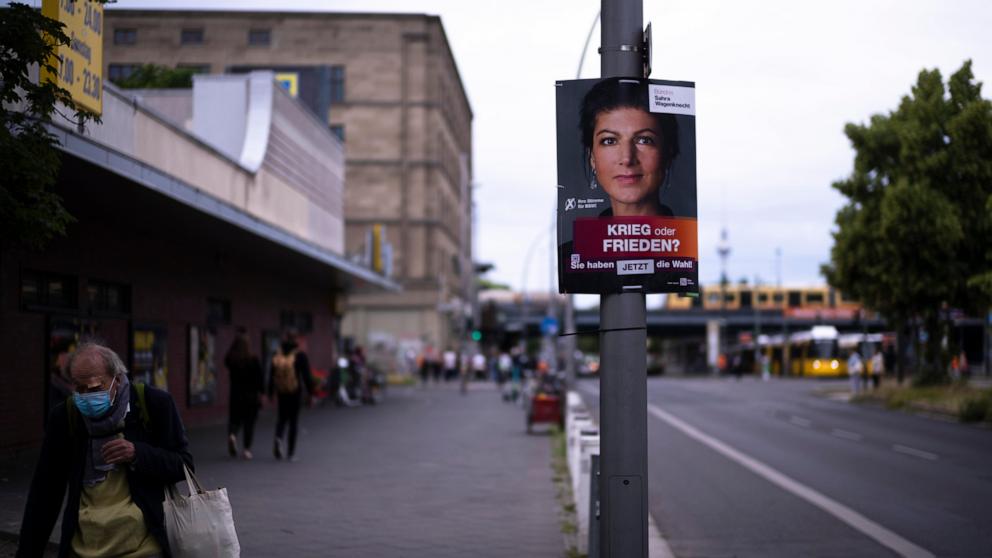BERLIN — A notoriously unpopular government plagued by internal conflict, a faltering economy, a powerful far-right party humiliated by a leading candidate and alienated by European allies, and a mainstream opposition still struggling to recover.
German politics are rocked by discontent and uncertainty as voters there prepare on June 9 to fill 96 of the 720 seats in the European Parliament, the largest single-country delegation in the 27-nation bloc.
It will be the first nationwide vote since centre-left Chancellor Olaf Scholz took power in late 2021, ending 16 years in power under his centre-right predecessor Angela Merkel. Merkel's era was characterised by consensual politics and a series of “grand coalition” governments between the traditional main parties from the right and left.
That rapprochement, which has been tested under Merkel by a series of crises and the rise of the far-right Alternative for Germany (AfD) party, is now completely over.
“These European elections are taking place in the context of an economic crisis, but also a government crisis because the government's approval rating is very low,” said Johannes Hillier, a political consultant in Berlin, adding that voters are likely to use the elections to express their discontent.
Government woes
In times of turmoil, Chancellor Olaf Scholz says, “trust is the best cure for extremism.” But his government does not engender much trust.
The coalition government of the Social Democrats, the environmental Greens and the pro-business Free Democrats has a record of achievements, including averting an energy crisis after Russia cut off gas supplies to Germany, providing large-scale aid to Ukraine (though the details have caused friction) and a series of social-liberal reforms.
But the overwhelming impression of a government that has sought to modernize Germany as Europe's largest economy struggles to grow has been one of continued discord.
Infighting within the coalition government has continued since the election, as the two parties argue over how to write the 2025 budget while adhering to Germany's strict self-imposed rules on debt expansion — a challenge that has already forced a court-ordered hasty reworking of the 2024 budget, including subsidy cuts, sparking protests from farmers.
Opposition to the Restoration
Opposition leader Friedrich Merz told parliament earlier this year that the government was “ruling against the vast majority of German voters and people,” lamenting that “doubt and uncertainty are rife.”
Since taking over after Germany's defeat in the 2021 federal election, Merz has sought to give the party once led by centrist Chancellor Angela Merkel a more explicitly conservative image.
Merkel's coalition has benefited only in part from the unpopularity of Scholz and his government. Despite a clear lead in the polls, its approval rating has struggled to rise above a mediocre 30 percent. There are doubts about how much appeal the 68-year-old Merz, a one-time rival of Merkel's who has never governed, will have with voters.
It is not yet clear who will challenge Scholz in a general election scheduled for autumn 2025. The coalition is due to be decided after three state elections in September in former communist eastern Germany.
The strength of the far-right and scandals
The European Parliament vote and state votes in three strongholds will pose a test for the AfD, which once garnered more than 20 percent support on widespread discontent.
A series of recent setbacks appears to have dented the party's popularity somewhat, starting with reports in January that extremists had met, attended by party members, to discuss deporting millions of immigrants, including German nationals. The reports sparked mass protests against the rise of the far right.
Last month, an aide to Maximilian Kurler, the AfD's top candidate in the European Parliament elections, was arrested on suspicion of spying for China. The party has already come under criticism for its pro-Russia stance. The party's second candidate, Petr Byström, denies allegations that he may have accepted funds from pro-Russia networks and is facing investigation.
The AfD then banned Mr Cra from campaigning after he told an Italian newspaper that not all members of Nazi elite SS units were war criminals, but that wasn't enough to prevent the party being expelled from the European Parliament's far-right “Identity and Democracy” group.
Separately, a court fined one of the AfD's most prominent figures, Bjorn Höcke, for deliberately using a Nazi slogan in a 2021 speech.
“Instead of being able to speak for itself, the AfD has to comment every week on scandals and allegations in the media,” Hillier said. AfD staunch supporters will not be discouraged, but “those who are unsure about whether to vote for the AfD may have second thoughts in the wake of these scandals and allegations.”
The AfD is still set to increase its vote share from the 11% it received in the 2019 European Parliament elections, but perhaps not by as much as hoped.
The new party, founded by prominent opposition politician Zahra Wagenknecht, combines left-wing economic policies with anti-immigration policies and other positions that may appeal to some AfD supporters, which some observers believe could deal a blow to the AfD's support.
Around 60.9 million German citizens are eligible to vote, and a further 4.1 million residents of other EU countries can decide whether to vote in Germany or in their home country.
___
Kerstin Sopke contributed to this report.


